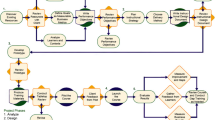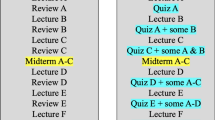Abstract
Medical school presents a unique challenge to the average learner as the instructional strategies used in medical curricula are often different than what the student has experienced prior. The large volume of information taught in medical school is delivered with a variety of techniques. After the educational material has been delivered, it is the student’s responsibility to study and learn the information for future exams and for their future patients. The current study aims to explore what learning activities and teaching strategies first (M1) and second year (M2) medical students use and prefer. Additionally, the study aims to determine if there are cohort differences in classroom and study habits. A group of 95 M1 students and 109 M2 students were recruited to participate in this online survey study. The analyses indicated statistical differences between M1 and M2 student cohorts with M1 students preferring group work and small group discussions more than M2 students. Classic didactic lecturing was preferred by 71.6% of students surveyed. M1 students reported a greater tendency for self-testing and group study versus M2 students. GPA and study technique preference were not correlated. These findings indicate that medical students are not using research-based learning and study strategies at the possible detriment of long-term knowledge retention. Modeling of research-based learning and study strategies by medical educators is one possible solution to encourage medical students to change their study practice. Future work should focus on how medical student learning preferences change as they progress through medical school.
Similar content being viewed by others
Availability of Data and Material
The dataset generated during and/or analyzed during the current study are available from the corresponding author on reasonable request.
Code Availability
Not applicable.
References
Vyas KS, Stratton TD, Soares NS. Sources of medical student stress. Education for Health. 2017;30(3):232–5.
Radcliffe C, Lester H. Perceived stress during undergraduate medical training: a qualitative study. Med Educ. 2003;37(1):32–8.
Zeeman JM, Kang I, Angelo TA. Assessing student academic time use: assumptions, predictions and realities. Med Educ. 2019;53(3):285–95.
Ismail S, et al. Preference of teaching and learning methods in a new medical school of Malaysia. Journal of Applied Pharmaceutical Science. 2014;4(2):48–55.
Jana P, et al. A study on the preference of teaching methods among medical undergraduate students in a tertiary care teaching hospital, India. J Educ Health Promot. 2020;9(1):275–275.
Dunlosky J, et al. Improving students’ learning with effective learning techniques. Psychol Sci Public Interest. 2013;14(1):4–58.
Karpicke JD. Retrieval-based learning: A decade of progress, in Cognitive psychology of memory, Vol. 2 of Learning and memory: A comprehensive reference, J.T. Wixted, Editor. Oxford: Academic Press; 2017. p. 487-514.
Larsen DP, et al. The importance of seeing the patient: test-enhanced learning with standardized patients and written tests improves clinical application of knowledge. Adv Health Sci Educ. 2013;18(3):409–25.
Blasiman RN, Dunlosky J, Rawson KA. The what, how much, and when of study strategies: comparing intended versus actual study behaviour. Memory. 2017;25(6):784–92.
Gurung RAR, Weidert J, Jeske A. Focusing on how students study. Journal of the Scholarship of Teaching and Learning. 2012;10(1):28–35.
Karpicke JD, Butler AC, Roediger HL 3rd. Metacognitive strategies in student learning: do students practise retrieval when they study on their own? Memory. 2009;17(4):471–9.
Dobson JL, Linderholm T. Self-testing promotes superior retention of anatomy and physiology information. Adv Health Sci Educ. 2015;20(1):149–61.
Dobson JL, Linderholm T, Stroud L. Retrieval practice and judgements of learning enhance transfer of physiology information. Adv Health Sci Educ. 2019;24(3):525–37.
Dobson JL, Perez J, Linderholm T. Distributed retrieval practice promotes superior recall of anatomy information. Anat Sci Educ. 2017;10(4):339–47.
Larsen DP, Butler AC, Roediger III HL. Repeated testing improves long-term retention relative to repeated study: a randomised controlled trial. Med Educ. 2009;43(12):1174–1181.
Linderholm T, Dobson J, Yarbrough MB. The benefit of self-testing and interleaving for synthesizing concepts across multiple physiology texts. Adv Physiol Educ. 2016;40(3):329–34.
McConnell MM, St-Onge C, Young ME. The benefits of testing for learning on later performance. Adv Health Sci Educ. 2015;20(2):305–20.
Deng F, Gluckstein JA, Larsen DP. Student-directed retrieval practice is a predictor of medical licensing examination performance. Perspectives on Medical Education. 2015;4(6):308–13.
Kortz MW, et al. A retrospective and correlative analysis of academic and nonacademic predictors of COMLEX level 1 performance. J Osteopath Med. 2022.
Desy JR, Reed DA, Wolanskyj AP. Milestones and millennials: a perfect pairing-competency-based medical education and the learning preferences of generation Y. Mayo Clin Proc. 2017;92(2):243–50.
Dilullo C, McGee P, Kriebel RM. Demystifying the millennial student: a reassessment in measures of character and engagement in professional education. Anat Sci Educ. 2011;4(4):214–26.
Roberts DH, Newman LR, Schwartzstein RM. Twelve tips for facilitating Millennials’ learning. Med Teach. 2012;34(4):274–8.
Freeman S, et al. Active learning increases student performance in science, engineering, and mathematics. Proc Natl Acad Sci. 2014;111(23):8410–5.
Emahiser J, et al. Study of live lecture attendance, student perceptions and expectations. Med Sci Educ. 2021;31(2):697–707.
Cebeci S, et al. Medical students’ approaches to learning and study skills. Procedia Soc Behav Sci. 2013;93:732–6.
Ward PJ. First year medical students’ approaches to study and their outcomes in a gross anatomy course. Clin Anat. 2011;24(1):120–7.
Karpicke JD, Aue WR. The testing effect is alive and well with complex materials. Educ Psychol Rev. 2015;27(2):317–26.
Larsen DP, Butler AC, Roediger III HL. Comparative effects of test‐enhanced learning and self‐explanation on long‐term retention. Med Educ. 2013;47(7):674–82.
Soderstrom NC, Bjork RA. Learning versus performance. Perspect Psychol Sci. 2015;10(2):176–99.
Dunlosky J, Rawson KA. Practice tests, spaced practice, and successive relearning: tips for classroom use and for guiding students’ learning. Scholarsh Teach Learn Psychol. 2015;1(1):72–8.
Yeh DD, Park YS. Improving learning efficiency of factual knowledge in medical education. J Surg Educ. 2015;72(5):882–9.
Author information
Authors and Affiliations
Contributions
Study conception and design, material preparation, and data collection and analysis were performed by Marissa Roffler. Substantial contributions to the analysis and interpretation of the data were made by Ryan Sheehy. The first draft of the manuscript was written by Marissa Roffler, and Ryan Sheehy commented, edited, and made substantial contributions to previous versions of the manuscript. All authors read and approved the final manuscript.
Corresponding author
Ethics declarations
Ethics Approval
This study was performed in line with the principles of the Declaration of Helsinki. Approval was granted by the Institutional Review Board of Kansas City University under 45 CFR 46.101-Exempt Category b-2 (July 11, 2018, No. 1240094–1).
Consent to Participate
Informed consent was obtained from all individual participants included in the study.
Consent for Publication
Not applicable.
Competing Interests
The authors declare no competing interests.
Additional information
Publisher's Note
Springer Nature remains neutral with regard to jurisdictional claims in published maps and institutional affiliations.
Rights and permissions
About this article
Cite this article
Roffler, M., Sheehy, R. Self-reported Learning and Study Strategies in First and Second Year Medical Students. Med.Sci.Educ. 32, 329–335 (2022). https://doi.org/10.1007/s40670-022-01533-w
Accepted:
Published:
Issue Date:
DOI: https://doi.org/10.1007/s40670-022-01533-w




